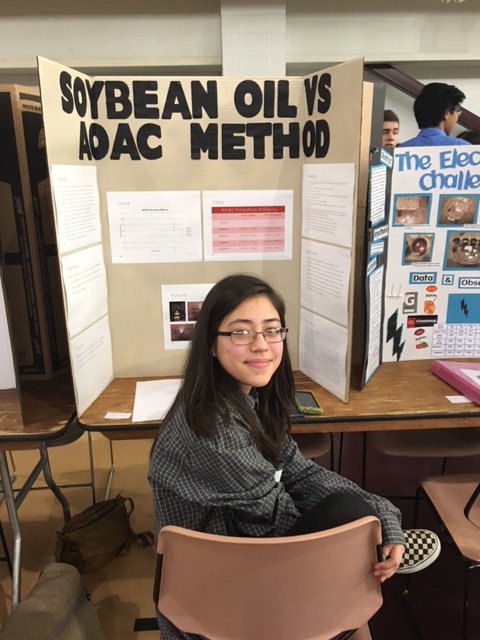Victoria Reid

Victoria Reid wins Arkansas Soybean Science Challenge Award at 2016 Central Arkansas Regional Science and Engineering Fair
Victoria Reid ,15, a 10th grader at Central High School in Little Rock won the regional round of the Soybean Science Challenge at the 2016 Central Arkansas Regional Science and Engineering Fair held at the University of Arkansas at Little Rock on March 4.
A $300 cash award was presented to Reid by Dr. Karen Ballard, director of the Soybean Science Challenge. The award was provided by the Arkansas Soybean Promotion Board. Her science project experimented with using soybean oil in place of Heptane in a filth analysis for popcorn to determine whether or not soybean oil would be a suitable replacement.
Reid said she was very excited about winning the Soybean Science Challenge. “I consume a lot of soybeans daily through tofu and soy milk, so when I heard about this challenge at the science fair last year, I entered with the goal of trying to create a winning project that also benefited soybean sustainability, so to have accomplished that made me extremely happy.”
Before Reid took the Soybean Science Challenge online course, she had little knowledge about soybeans. She knew some of the basics like the incorporation of the bean into foods such as edamame, tofu, milk and oil. However she did not know how the beans were processed or the major role soybeans play in Arkansas agriculture.
Reid particularly enjoyed learning about the multiple uses of soybeans in crayons, animal feeds, and everyday necessities that people might not realize contain soybeans. “It’s impressive to me that such a small plant can have so many uses in such a variety of products.”
The interactive learning portions of the Soybean Science Challenge online course also appealed to Reid. “They kept me engaged while still teaching me valuable information about various soybean topics.”
Her parents, Steven and Siang Reid were surprised and thrilled for her. “On our way home from the 2015 state science fair, Tori indicated that she wanted to compete in the 2016 Soybean Science Challenge, and for her to set that goal, follow through and win, made us very proud parents.
Reid’s parents said she started gravitating to science classes at the start of her junior high years. The school she attended emphasized science and math courses. “She just clicked with them and enrolled in as many science courses as the curriculum allowed. Tori won first place in her category (botany) in her first science fair and her interest has continually grown.”
When asked about the most important conclusion of her study, Reid said, “Soybean oil is a viable flotation liquid when compared to AOAC methods when using macro filth particles. This is a start in the process of determining whether or not soybean oil could be used in filth methods in testing of our foods for filth.
Reid plans to build on her research by re-creating the experiment to begin testing soybean oil as a viable flotation liquid in filth recovery methods using micro filth particles. “I know the replacement should work. However in order to determine if the swapping from Heptane to soybean oil would work in a more real-life setting, the test would have to include micro particles as well.
Reid’s parents said her interest in science continues to grow through her many friends who also share her love of science and now attend high school together.
Reid said through the course and her participation in the Soybean Science Challenge she gained a newfound respect for soybeans and all they do for people and animals. “I was also able to develop, through my participation in this challenge, another project idea that I am interested in and would like to continue testing.”
“The Arkansas Soybean Science Challenge Award program is in its third year partnership between the Arkansas Soybean Promotion Board and the University of Arkansas Division of Agriculture-Cooperative Extension Service,” said Dr. Karen Ballard, director and developer of the program.
Engaging and rewarding students in real-world educational research that supports the Arkansas soybean industry and agricultural sustainability is the goal of The Challenge which opened in 2014 to 9-12 grade Arkansas science students. Students who successfully completed the online course were eligible to have their original soybean-related projects judged at the 2016 ISEF affiliated Arkansas science and engineering fairs.
For more information on the Soybean Science Challenge, contact Dr. Karen Ballard at (501) 671-2086 or kballard@uaex.edu.
Victoria Reid – Arkansas Soybean Science Challenge Regional Winner – 2016 Central Arkansas Science and Engineering Fair
Project Title: Soybean Oil vs AOAC Method
Abstract: In this experiment soybean oil was used in place of Heptane in a filth analysis for popcorn to determine whether or not it would be a suitable replacement. It was believed that the two would be substitutes as other filth analysis methods use oil rather than Heptane. To test this five trials were conducted, a control which followed basic procedure including no added filth, two Heptane with added filth, and two soybean oil flotations with added filth. AOAC method 950.91 directions were used and were briefly as follows: Popcorn was boiled in water, cooled, and then the flotation liquid was added, let sit, and trapped off to be filtered. In the end, the hypothesis was proven correct and the conducted trials showed soybean oil as being as good or better at efficiently capturing the filth from the popcorn.

Victoria Reid
